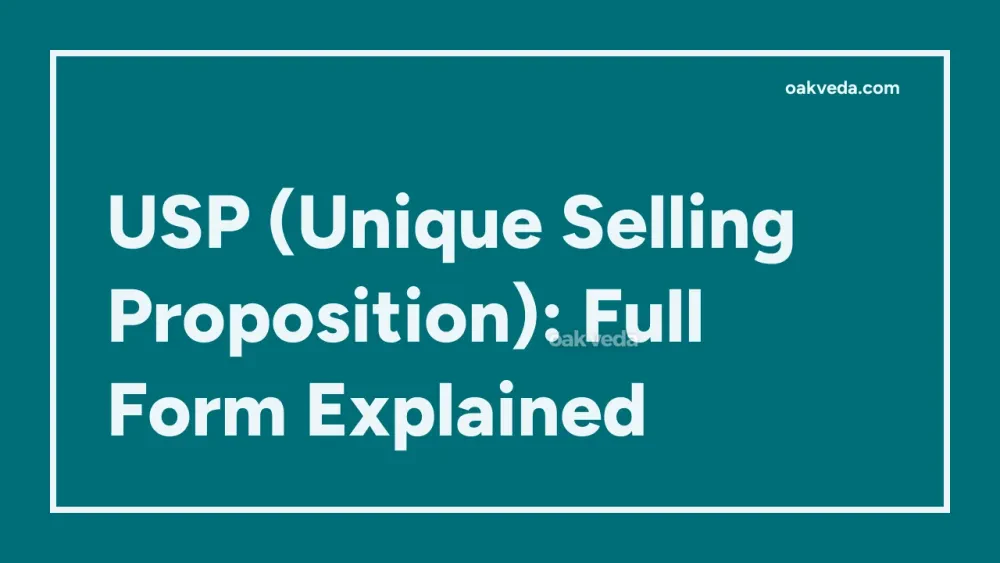
What is the Full Form of USP?
The full form of USP is "Unique Selling Proposition" or "Unique Selling Point." This term is widely used in marketing and business strategy to describe a distinctive feature or characteristic that sets a product, service, or company apart from its competitors.
What is Unique Selling Proposition?
A Unique Selling Proposition (USP) is a marketing concept that identifies and communicates the unique benefit or advantage a product, service, or brand offers to its target audience. It's a key element that differentiates a company's offering from those of its competitors, making it more attractive to potential customers.
Origin and Development of Unique Selling Proposition
The concept of the Unique Selling Proposition was first introduced in the early 1940s by Rosser Reeves, a pioneering advertising executive. Reeves developed this idea as a response to ineffective marketing and advertising campaigns he observed. He hypothesized that successful campaigns should focus on a single, unique benefit that would prompt consumers to choose one product or brand over another.
Over time, the USP concept has evolved and become a fundamental principle in marketing strategy. It has adapted to changing consumer behaviors, market dynamics, and the rise of digital marketing.
How does Unique Selling Proposition work?
A Unique Selling Proposition works by:
- Identifying a specific customer need or desire
- Highlighting a unique feature or benefit that addresses this need
- Communicating this advantage clearly and consistently across all marketing channels
- Differentiating the product or service from competitors
- Creating a memorable impression in the minds of consumers
By focusing on a distinct advantage, businesses can create a strong brand identity and position themselves effectively in the market.
Functions of Unique Selling Proposition
The primary functions of a USP include:
- Differentiation: Helping a product or service stand out in a crowded market
- Value Communication: Clearly expressing the unique value offered to customers
- Brand Positioning: Establishing a distinct place in the consumer's mind
- Decision Facilitation: Assisting customers in making purchasing decisions
- Marketing Focus: Providing a central theme for marketing and advertising efforts
Applications of Unique Selling Proposition
USPs are applied across various aspects of business and marketing:
- Product Development: Guiding the creation of features that set products apart
- Branding: Shaping brand identity and messaging
- Advertising: Forming the core message in promotional campaigns
- Sales: Providing sales teams with compelling arguments to close deals
- Customer Service: Informing how customer interactions are handled to reinforce the unique value proposition
Features of an Effective Unique Selling Proposition
A strong USP typically has the following characteristics:
- Uniqueness: Offers a benefit not readily available from competitors
- Relevance: Addresses a significant customer need or desire
- Clarity: Can be easily understood and communicated
- Specificity: Focuses on a particular advantage rather than being too broad
- Sustainability: Can be maintained over time and is not easily replicated
- Authenticity: Aligns with the actual capabilities and values of the business
Benefits of Implementing a Unique Selling Proposition
Developing and implementing a strong USP can lead to several benefits:
- Increased Brand Recognition: A clear USP helps customers remember and identify your brand
- Improved Customer Loyalty: When customers understand your unique value, they're more likely to remain loyal
- Higher Conversion Rates: A compelling USP can drive more potential customers to make purchases
- Premium Pricing Potential: A strong unique advantage can justify higher prices
- Focused Marketing Efforts: USPs provide a clear direction for all marketing activities
- Competitive Edge: A well-defined USP helps businesses compete more effectively, even against larger competitors
Limitations or Challenges of Unique Selling Proposition
While USPs are powerful tools, they come with some challenges:
- Difficulty in Identification: Finding a truly unique selling point can be challenging in saturated markets
- Maintaining Uniqueness: Competitors may try to copy or improve upon your USP
- Changing Market Conditions: What's unique today may become standard tomorrow
- Customer Perception: The perceived value of your USP may differ from your intended message
- Overemphasis: Focusing too much on one unique aspect might overshadow other important features
Future Developments in Unique Selling Proposition Strategy
As markets evolve, so does the concept of USP:
- Personalization: USPs may become more tailored to individual customer preferences
- Experience-Based USPs: Focus may shift from product features to unique customer experiences
- Ethical and Sustainable USPs: Growing importance of social and environmental responsibility in defining uniqueness
- AI-Driven USP Development: Utilizing big data and AI to identify and refine unique selling points
- Dynamic USPs: Adapting selling propositions in real-time based on market trends and customer behavior
FAQs on USP Full Form
-
What's the difference between USP and value proposition? While related, a USP is more specific, focusing on a single unique benefit, whereas a value proposition can encompass multiple benefits.
-
Can a company have multiple USPs? While possible, it's generally more effective to focus on one primary USP to avoid diluting the message.
-
How often should a USP be updated? USPs should be reviewed regularly and updated when market conditions change or when they no longer provide a competitive advantage.
-
Is a low price a good USP? While price can be a differentiator, it's often not sustainable long-term and can be easily matched by competitors.
-
How do you create a USP for a service-based business? Focus on unique aspects like specialized expertise, exceptional customer service, or innovative delivery methods.
In conclusion, understanding and implementing a strong Unique Selling Proposition is crucial for businesses looking to stand out in today's competitive marketplace. By clearly communicating what makes your offering special, you can attract and retain customers more effectively, driving long-term success for your brand.
You may be interested in:

